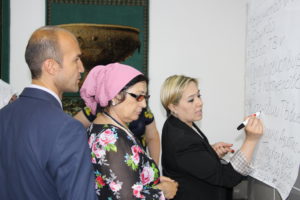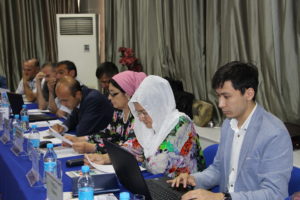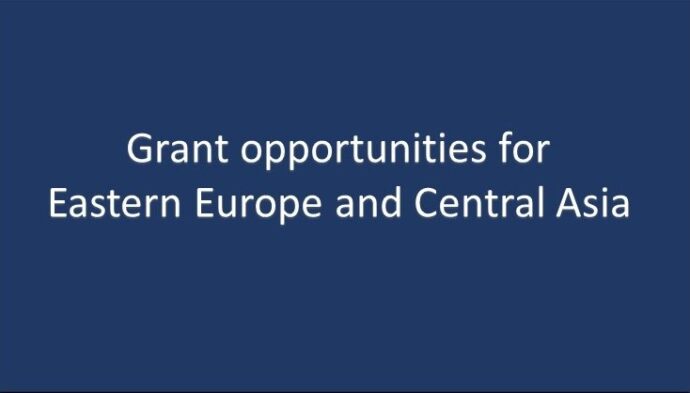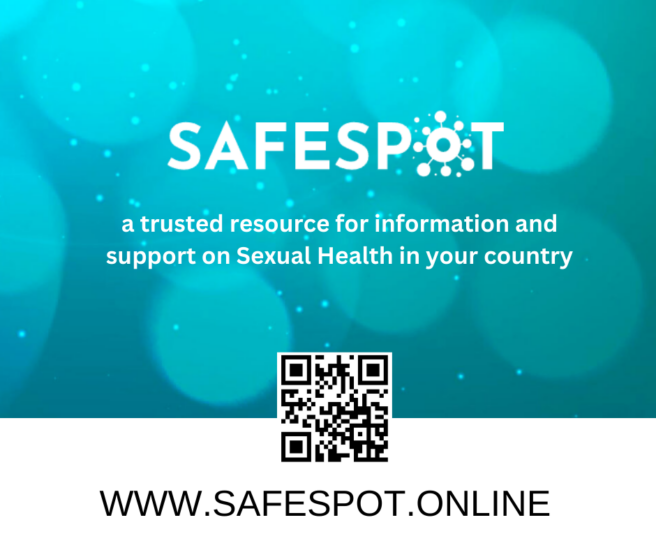 Author: Marina Maximova, Kazakhstan
Author: Marina Maximova, Kazakhstan
During the regional seminar-meeting held on 6-7 June in Almaty, Central Asian nongovernmental organizations established a network of partner organizations to address issues of labour migration and tuberculosis. The participants accepted draft Memorandum of cooperation between non-profit organizations to reduce the prevalence and incidence of tuberculosis among migrant workers in the countries of the region.
“This document was created in response to the need of NGOs consolidation to educate migrant workers about TB symptoms and the opportunities of free treatment and diagnostics in the framework of the project, to promote treatment compliance, to exchange information and to disseminate best practices in the countries of Central Asian region,” says a project manager of the Global Fund, a representative of Project HOPE in the Republic of Kazakhstan Bakhtiyar Babamuratov.
The event was organized by the Project HOPE in the framework of the grant from Global Fund to fight AIDS, tuberculosis and malaria. Representatives of non-governmental organizations from Kazakhstan, Kyrgyzstan, Tajikistan and Uzbekistan attended the seminar .
Migrants do not want to be treated
From all the countries in the Central Asian region, Kazakhstan is accommodating the main stream of migrant workers from neighbouring countries. Migration flow continues to grow. Those who come to find a job often agree to any work, they often live in poor housing conditions and do not eat well. This results in tuberculosis development. In 2016, 753 external migrants addressed the organizations of primary health care and TB facilities of Kazakhstan and were tested for tuberculosis. In 2015, there were only 157 visits. Most migrant workers prefer not to attend medical institutions and refuse to be treated in the TB clinics or to be examined by a doctor. They consider it to be a wasting of working time, i.e. money. They have to support families left at home, therefore money is the main reason to come to a foreign country. For the same reason people do not want to spend money on health, even though a Comprehensive plan to combat tuberculosis in Kazakhstan for 2014-2020 involves activities to improve TB services for migrant workers.
Particularly alarming are the cases when a migrant worker is diagnosed with HIV/TB co-infection, and when such patient needs a serious treatment and social support. This important topic will be discussed in 2018 in the framework of the 22nd international AIDS conference – AIDS 2018 – in Amsterdam. This conference will be very special as for AFEW International and the whole region where the organization works — Eastern Europe and Central Asia.
 Work at construction sites and markets
Work at construction sites and markets
In the situation mentioned above, the participation of the NGOs in addressing of this issue has become very important. Outreach workers and volunteers – people, whom the target group trusts, – are searching for migrant workers on construction sites, at the farms, markets, in the restaurants or cafes. They tell migrants about the disease and the free treatment, convince to pass the examination and to provide social support. The results of such work are impressive.
“Within the project, implemented by Project HOPE in 2016, staff and volunteers of our public Fund helped 898 migrant workers to be tested for tuberculosis. For 25 of them the diagnosis was confirmed, and with our assistance people were able to receive free treatment. Besides, we provided migrant workers with motivational food packages. 8,312 labour migrants received information about the symptoms of tuberculosis, and now they know where to go if they are sick,” says the Director of the Public Fund Taldykorgan regional Foundation of employment promotion Svetlana Saduakasova.
These are the results of the activity of only one non-governmental organization in Kazakhstan. Nowadays, social activists are effectively working in eight regions of the country. Such results are possible to achieve only thanks to active collaboration with the non-governmental organizations from those countries where work migrants come from. The community members actively communicate with each other and exchange useful information to be aware of whether the diagnosed person came back to his home city, got registered in the TB clinic, continued to receive treatment, and so on. Only under these conditions we can achieve a complete recovery from TB for each individual and finally stop the growth of morbidity in the region.




